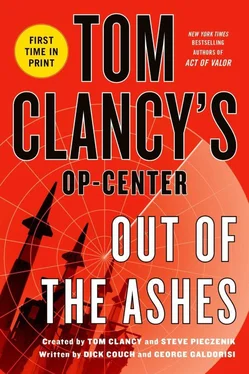Al-Wandi cast a sideways glace at a man, a white man, working in the corner of the blockhouse. “Is he doing what you are paying him to do?” the prince asked, his voice stern, his look hard.
“Yes. Yes, he is. We could not pull this off without him,” Makhdoom replied in as reassuring terms as possible.
Like most Saudis, al-Wandi hated infidels, especially American infidels, on Saudi Arabia’s sacred soil. However, Makhdoom had convinced him early on this man, an American engineer from Northrop Grumman, builder of the Global Hawk, was absolutely indispensable. He had patiently explained to the prince that try as they might — and even with the stolen technology he had obtained — his best technicians could not crack all of the security codes they needed to break. Without these codes, they could not make the Global Hawk do precisely what they wanted it to do.
Makhdoom had told the prince he had persuaded the man to leave Northrop Grumman and he would be paid handsomely for his efforts. He felt no need to tell him what he had to do in order to secure the services of this decadent American. The prince did not need to know he had to ensnare the man in a sex scandal. Had Makhdoom released the secret video he took of the American’s escapades, it would surely have caused him to lose his security clearance. That would have ended his employability by Northrop Grumman or any other defense contractor. Sending the video to the man’s wife, as he threatened to do, would surely have ended his marriage. The process didn’t matter; the results did. This former Northrop Grumman technician now worked side by side with his men. The American was doing precisely what Makhdoom needed him to do, and the prince was pleased. That was what really mattered.
Al-Wandi was curious enough to go see what this infidel was working on. Makhdoom darted ahead to ensure the man showed the prince the proper respect. He failed.
“My man tells me you have expert skills,” the prince began, his eyes narrowed and his tone harsh.
“I am doing what you pay me to do,” the man replied, his tone anything but respectful.
“I would hope so. I’m told we are paying you enough money,” the prince shot back.
“Look, you can’t do this without me. What you’re paying me is a pittance for what you’re getting. Deal with it,” the man replied, almost snarling as he looked up and down the prince’s enormous bulk with clear disdain.
“So you say,” the prince replied, seething, as he turned on his heel and walked away. He made a mental note to tell his bodyguard to kill this infidel, slowly, once their operation was complete.
Jawad Makhdoom was eager to placate the prince after that encounter. Although Prince Ali didn’t understand all of the technology, the chief engineer began to explain how they were able to do what they were doing. After a lengthy explanation, Ali al-Wandi was both pacified and pleased. His plan had come together and now he was ready for action.
“We picked this spot well,” Makhdoom continued. “As we predicted, we’re right on the flight path and under the footprint.”
“Good, this is exactly where we want to be,” Ali al-Wandi replied. “We are talking about the right footprint, aren’t we?”
“We are,” the man continued. “This location is far from civilization and the men grumble about that, but we are along the path of the standard route flown by the U.S. Global Hawk.”
“Please assure me that it is the right one,” the prince replied. He had too much riding on this and there could be no mistakes or oversights.
“Yes, it’s the Global Hawk the Americans call Two Bravo,” Makhdoom replied. “It flies from its small aerodrome near Central Command’s forward base in Qatar, then over our desert in a roughly northwesterly direction, and then over Jordan and Syria to the Mediterranean where it reverses course and returns, covering the same route.”
“That’s good, and we’ll soon have something to say about what it sees, won’t we?” al-Wandi replied. The prince’s soft brown eyes conveyed approval but his body language told the man his superior wanted it done right — or else.
Makhdoom knew the prince trusted him to do what was expected, but he felt if he explained how this all worked, Al Wandi would trust him even more.
“Your Excellency, what we’re doing is really quite simple given the technology you’ve provided to us. When Global Hawk Two Bravo passes over this ballistic missile site it digitally records what it sees, just like everything else on its flight path. We’ve calculated the speed of the bird and given the size of the site, the time it appears on the Global Hawk’s digital memory is precisely 26.47 seconds—”
“I had no idea you had it calculated that exactly,” the prince interrupted.
“Oh, we had to be that accurate, Your Excellency. That is critical to know so we can put a 26.47-second time-jump in the digital recording so what the Global Hawk appears to capture is just a continuous picture of an empty desert as it passes over our site.”
“I see.”
“Your Excellency, I can’t emphasize enough how precise our calculations must be. Hours later, when the Global Hawk is just where we want it to be, we insert that 26.47 seconds of video back into its digital memory. Then it ‘sees’ the site just where we want it to be seen, in the Syrian desert, not far from Damascus,” Makhdoom concluded with a bit of a flourish.
Ali al-Wandi allowed himself a slight smile. He knew the Americans would be alarmed the Syrians had this missile, the DF-21D carrier-killer, operational. He just needed them to take action when they did.
“You have done well. I could not have hoped for better results. We’ll put your system into action soon. Can you be ready at a moment’s notice?”
“Yes, we can, Your Excellency, absolutely.”
“Good. I will be back frequently to check your progress,” the prince replied. He was pleased. It was all coming together.
As for the American contractor, he would deal with him soon enough.
* * *
Hibah Nawal leaned against the hood of his Range Rover watching his two-dozen kinsmen break down the former pipeline-worker barracks. As they disassembled one portion of the prefabricated building, they used forklifts and portable cranes to load it on the semis parked nearby.
As each semi was fully loaded it drove off in an easterly direction to a location just over forty kilometers away. At that site to the east, other members of the mukhtar’s tribe were reassembling the building according to the specifications Nawal had provided to them. These men from the Rulawa tribe were being paid an extra bonus for this work, and the fact that the new “barracks” was in the middle of the trackless Syrian desert did not concern them. Nor was the fact that they also carried a truckload of camouflage netting to this new location. The mukhtar had given them a nearly impossible deadline to complete their work, and they had no time for wondering.
* * *
As Laurie Phillips had explained to her roommate, she was feeling a sense of accomplishment during her daily routine in Normandy ’s Combat Direction Center.
Always shorthanded, the watch teams that manned CDC didn’t take long to recognize Laurie’s IT skills, the fact that she was a quick study, and her willingness to work hard. The officers, chief petty officers, and sailors laboring away in CDC looked at her as an increasingly valuable asset. As Laurie sat at the Global Hawk console looking up at the monitor, she reflected how things had come full circle since her days at the National Reconnaissance Office. She recalled her experience the first time she sat down at that console during her first week aboard Normandy .
Читать дальше












